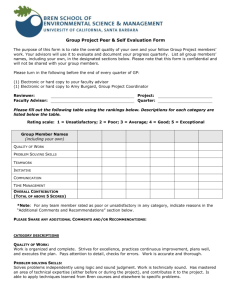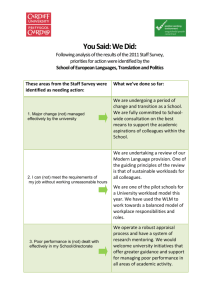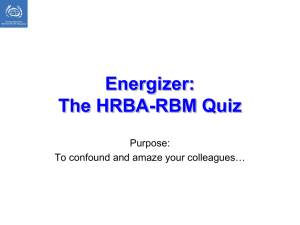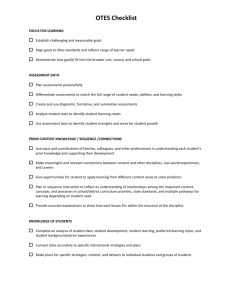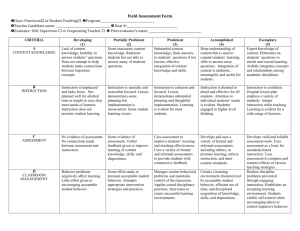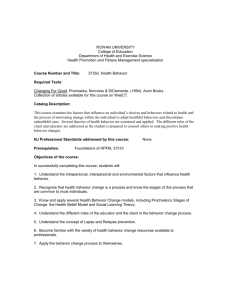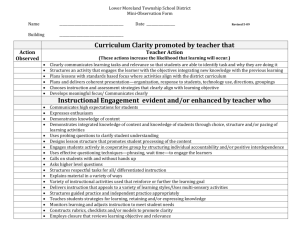Domain 1: Planning and Preparation
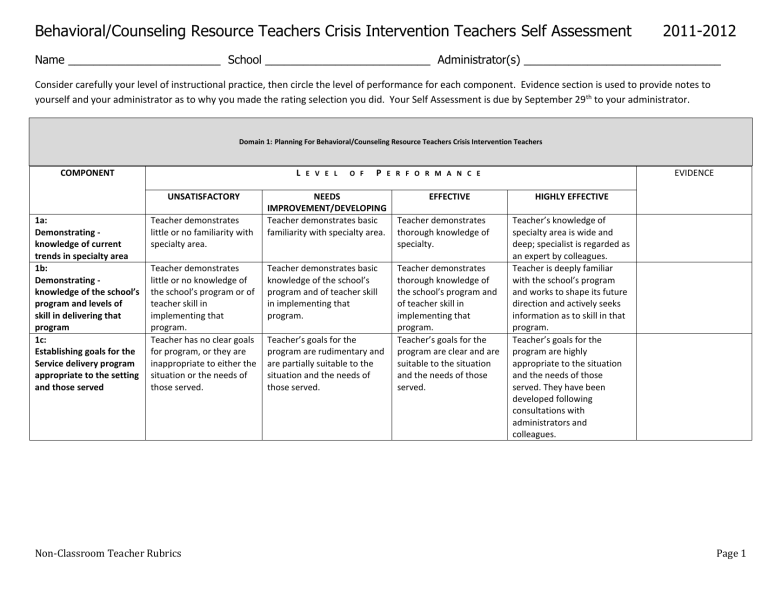
Behavioral/Counseling Resource Teachers Crisis Intervention Teachers Self Assessment 2011-2012
Name ________________________ School __________________________ Administrator(s) _______________________________
Consider carefully your level of instructional practice, then circle the level of performance for each component. Evidence section is used to provide notes to yourself and your administrator as to why you made the rating selection you did. Your Self Assessment is due by September 29 th to your administrator.
Domain 1: Planning For Behavioral/Counseling Resource Teachers Crisis Intervention Teachers
COMPONENT L E V E L O F P E R F O R M A N C E
1a:
Demonstrating knowledge of current trends in specialty area
1b:
Demonstrating knowledge of the school’s program and levels of skill in delivering that program
1c:
Establishing goals for the
Service delivery program appropriate to the setting and those served
UNSATISFACTORY
Teacher demonstrates little or no familiarity with specialty area.
Teacher demonstrates little or no knowledge of the school’s program or of teacher skill in implementing that program.
Teacher has no clear goals for program, or they are inappropriate to either the situation or the needs of those served.
NEEDS
IMPROVEMENT/DEVELOPING
Teacher demonstrates basic familiarity with specialty area.
Teacher demonstrates basic knowledge of the school’s program and of teacher skill in implementing that program.
Teacher’s goals for the program are rudimentary and are partially suitable to the situation and the needs of those served.
EFFECTIVE
Teacher demonstrates thorough knowledge of specialty.
Teacher demonstrates thorough knowledge of the school’s program and of teacher skill in implementing that program.
Teacher’s goals for the program are clear and are suitable to the situation and the needs of those served.
HIGHLY EFFECTIVE
Teacher’s knowledge of specialty area is wide and deep; specialist is regarded as an expert by colleagues.
Teacher is deeply familiar with the school’s program and works to shape its future direction and actively seeks information as to skill in that program.
Teacher’s goals for the program are highly appropriate to the situation and the needs of those served. They have been developed following consultations with administrators and colleagues.
EVIDENCE
Non-Classroom Teacher Rubrics Page 1
COMPONENT
1d:
Demonstrating knowledge of resources, both within and beyond the school and district
1f:
Developing a plan to evaluate the program
UNSATISFACTORY
Teacher demonstrates little or no knowledge of resources available in the school or district for teachers to advance their skills.
1e:
Planning the service program, integrated with the overall school program
Teacher’s plan consists of a random collection of unrelated activities, lacking coherence or an overall structure.
Teacher has no plan to evaluate the program or resists suggestions that such an evaluation is important.
Domain 1: Planning For Behavioral/Counseling Resource Teachers Crisis Intervention Teachers
(CONTINUED)
L E V E L O F P E R F O R M A N C E
NEEDS
IMPROVEMENT/DEVELOPING
Teacher demonstrates basic knowledge of resources available in the school and district for teachers to advance their skills.
EFFECTIVE
Teacher is fully aware of resources available in the school and district and in the larger professional community for teachers to advance their skills.
Teacher’s plan has a guiding principle and includes a number of worthwhile activities, but some of them don’t fit with the broader goals.
Teacher has a rudimentary plan to evaluate the instructional support program.
Teacher’s plan is well designed to support and implementing program services.
HIGHLY EFFECTIVE
Teacher actively seeks out new resources from a wide range of sources to enrich teachers’ skills in implementing the school’s program.
Teacher’s plan is highly coherent, and serves to support student and staff within the overall school setting.
Teacher’s plan to evaluate the program is organized around clear goals and the collection of evidence to indicate the degree to which the goals have been met.
Teacher’s evaluation plan is highly sophisticated, with imaginative sources of evidence and a clear path toward improving the program on an ongoing basis.
EVIDENCE
Non-Classroom Teacher Rubrics Page 2
COMPONENT
Domain 2: The Environment
For Behavioral/Counseling Resource Teachers Crisis Intervention Teachers
(CONTINUED)
L E V E L O F P E R F O R M A N C E
2a:
Creating an environment of trust and respect
2b:
Establishing a culture for ongoing instructional improvement
2c:
Establishing clear procedures for teachers to gain access to instructional support
UNSATISFACTORY
Teachers are reluctant to request assistance from the Teacher, fearing that such a request will be treated as a sign of deficiency.
Teacher makes no attempt to establish a culture for productive communication in the school as a whole, either among students or among teachers, or between students and teachers.
NEEDS
IMPROVEMENT/DEVELOPING
Relationships with the
Teacher are cordial; teachers don’t resist initiatives established by the instructional specialist.
Teacher attempts to promote a culture throughout the school for productive and respectful communication between and among students, teachers and parents are partially successful.
EFFECTIVE
Relationships with
Teacher are respectful, with some contacts initiated by teachers.
Teacher promotes a culture throughout the district for productive and respectful communication between and among students, teachers, and parents.
Teacher’s routines for student support services are nonexistent or in disarray.
Teacher has rudimentary and partially successful routines for student support services.
Teacher’s routines for student support services are clear and effective.
HIGHLY EFFECTIVE
Relationships with Teacher are highly respectful and trusting, with many contacts initiated by teachers.
The culture in the school district for productive and respectful communication between and among students, teachers and parents while guided by the teacher, is maintained by teachers (others), students and parents.
Teacher’s routines for student support services are clear and provided in consultation with school personnel.
EVIDENCE
Non-Classroom Teacher Rubrics Page 3
COMPONENT
Domain 2: The Environment
For Behavioral/Counseling Resource Teachers Crisis Intervention Teachers
(CONTINUED)
L E V E L O F P E R F O R M A N C E
2d:
Establishing and maintaining norms of behavior for professional interactions
2e:
Organizing physical space
UNSATISFACTORY
No norms of professional conduct have been established; teachers are frequently disrespectful in their interactions with one another.
Teacher makes poor use of the physical environment, resulting in poor access by some participants, time lost due to poor use of equipment, or little alignment between the physical arrangement and the activities.
NEEDS
IMPROVEMENT/DEVELOPING
Teacher’s efforts to establish norms of professional conduct are partially successful.
EFFECTIVE
Teacher has established clear norms of mutual respect for professional interaction.
The physical environment does not impede activities.
Teacher makes good use of the physical environment, resulting in engagement of all participants in the activities
HIGHLY EFFECTIVE
Teacher has established clear norms of mutual respect for professional interaction.
Teachers ensure that their colleagues adhere to these standards of conduct.
Teacher makes highly effective use of the physical environment, with teachers contributing to the physical arrangement.
EVIDENCE
Non-Classroom Teacher Rubrics Page 4
COMPONENT
3a:
Assessing student needs
UNSATISFACTORY
Teacher does not assess student needs, or the assessments result in inaccurate conclusions.
Domain 3: The Delivery of Service
For Behavioral/Counseling Resource Teachers Crisis Intervention Teachers
(CONTINUED)
L E V E L O F P E R F O R M A N C E
NEEDS
IMPROVEMENT/DEVELOPING
Teacher’s assessments of student needs are perfunctory.
EFFECTIVE
Teacher assesses student needs and provides appropriate services.
HIGHLY EFFECTIVE
Teacher consults with colleagues and conducts detailed and individualized assessments of student needs to contribute to program planning.
Teacher helps individual students and teachers formulate and implement personal social plans.
3b:
Assisting students and teachers in the formulation and implantation of academic, personal/social plans, based on knowledge of student needs
3c:
Sharing expertise with staff
Teacher program is independent of identified student needs.
Teacher’s model lessons and workshops are of poor quality or are not appropriate to the needs of the teachers being served.
Teacher attempts to help students and teachers formulate personal/social are partially successful.
The quality of model lessons and workshops is mixed, with some of them being appropriate to the needs of the teachers being served.
Teacher helps students and teachers formulate personal/social plans for groups of students.
The quality of the
Teacher’s model lessons and workshops is uniformly high and appropriate to the needs of the teachers being served.
The quality of Teacher’s model lessons and workshops is uniformly high and appropriate to the needs of the teachers being served.
The Teacher conducts extensive follow-up work with teachers.
EVIDENCE
Non-Classroom Teacher Rubrics Page 5
COMPONENT
3d:
Brokering resources to meet needs
3e:
Demonstrating flexibility and responsiveness
Domain 3: The Delivery of Service
For Behavioral/Counseling Resource Teachers Crisis Intervention Teachers
(CONTINUED)
L E V E L O F P E R F O R M A N C E
UNSATISFACTORY
Teacher does not make connections with other programs in order to meet student needs.
Teacher adheres to his plan, in spite of evidence of its inadequacy.
NEEDS
IMPROVEMENT/DEVELOPING
Teacher efforts to broker services with other programs in the school are partially successful.
Teacher makes modest changes in the support program when confronted with evidence of the need for change.
EFFECTIVE
Teacher brokers with other programs within the school or district to meet student needs.
Teacher makes revisions to the support program when it is needed.
HIGHLY EFFECTIVE
Teacher brokers with other programs and agencies both within and beyond the school or district to meet individual student needs.
Teacher is continually seeking ways to improve the support program and makes changes as needed in response to student, parent, or teacher input.
EVIDENCE
Non-Classroom Teacher Rubrics Page 6
COMPONENT
4a:
Reflecting on practice
4b:
Communicating with families
4c:
Maintaining accurate records
Domain 4: Professional Responsibilities
For Behavioral/Counseling Resource Teachers Crisis Intervention Teachers
(CONTINUED)
L E V E L O F P E R F O R M A N C E
UNSATISFACTORY
Teacher does not reflect on practice, or the reflections are inaccurate or self-serving.
Teacher fails to communicate with families and secure necessary permission for evaluations or communicates in an insensitive manner.
Teacher records are in disarray; they may be missing, illegible, or stored in an insecure location.
NEEDS
IMPROVEMENT/DEVELOPING
Teacher’s reflection on practice is moderately accurate and objective without citing specific examples and with only global suggestions as to how it might be improved.
Teacher communication with families is partially successful; permissions are obtained, but there are occasional insensitivities to cultural and linguistic traditions.
Teacher records are accurate and legible and are stored in a secure location.
EFFECTIVE
Teacher’s reflection provides an accurate and objective description of practice, citing specific positive and negative characteristics.
Instructional specialist makes some specific suggestions as to how the support program might be improved.
Teacher communicates with families and secures necessary permission for evaluations and does so in a manner sensitive to cultural and linguistic traditions.
Teacher records are accurate and legible, well organized, and stored in a secure location.
HIGHLY EFFECTIVE
Teacher’s reflection is highly accurate and perceptive, citing specific examples.
Instructional specialist draws on an extensive repertoire to suggest alternative strategies, accompanied by a prediction of the likely consequences of each.
Teacher secures necessary permissions and communicates with families in a manner highly sensitive to cultural and linguistic traditions. Psychologist reaches out to families of students to enhance trust.
Teacher records are accurate and legible, well organized, and stored in a secure location. They are written to be understandable to another qualified professional.
EVIDENCE
Non-Classroom Teacher Rubrics Page 7
COMPONENT
4d:
Participating in a professional community
4e:
Engaging in professional development
4f:
Showing professionalism
Domain 4: Professional Responsibilities
For Behavioral/Counseling Resource Teachers Crisis Intervention Teachers
(CONTINUED)
L E V E L O F P E R F O R M A N C E
UNSATISFACTORY
Teacher relationships with colleagues are negative or self-serving, and counselor avoids being involved in school and district events and projects.
Teacher does not participate in professional development activities even when such activities are clearly needed for the development of counseling skills.
Teacher displays dishonesty in interactions with colleagues, students, and the public; violates principles of confidentiality.
NEEDS
IMPROVEMENT/DEVELOPING
Teacher relationships with colleagues are cordial, and counselor participates in school and district events and projects when specifically requested.
Teacher participation in professional development activities is limited to those that are convenient or are required.
EFFECTIVE
Teacher participates actively in school and district events and projects and maintains positive and productive relationships with colleagues.
Teacher seeks out opportunities for professional development based on an individual assessment of need.
Teacher is honest in interactions with colleagues, students, and the public; does not violate confidentiality.
Teacher displays high standards of honesty, integrity, and confidentiality in interactions with colleagues, students, and the public; advocates for students when needed.
HIGHLY EFFECTIVE
Teacher makes a substantial contribution to school and district events and projects and assumes leadership with colleagues.
Teacher actively pursues professional development opportunities and makes a substantial contribution to the profession through such activities as offering workshops to colleagues.
Teacher can be counted on to hold the highest standards of honesty, integrity, and confidentiality and to advocate for students, taking a leadership role with colleagues.
EVIDENCE
